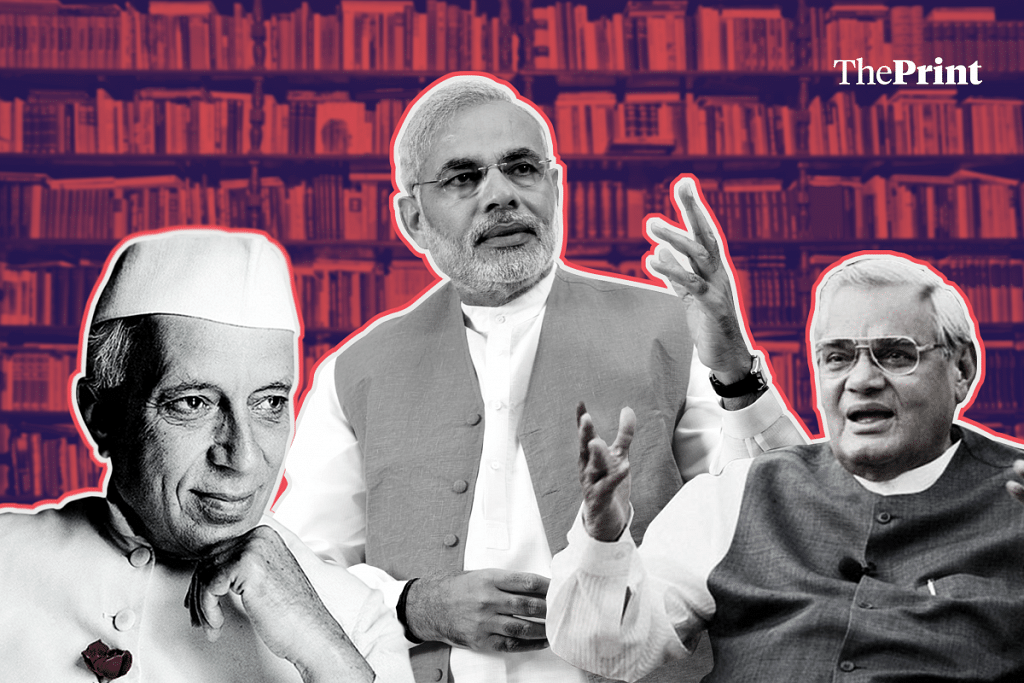Indian PMs have explored a wide range of topics in their written work – from Nehru’s Discovery of India to Modi’s Exam Warriors.
New Delhi: India’s prime ministers have often penned down their thoughts for the public. Most recently, Narendra Modi, in his attempt to woo first-time voters in 2019, has written a book called Exam Warriors, which teaches students rigorous discipline to help them crack board exams.
The publication of Exam Warriors has generated a buzz around Narendra Modi the author. He has definitely established himself as prolific writer — Modi and Atal Bihari Vajpayee have surpassed Jawaharlal Nehru in terms of the sheer number of books each of them has written.
Who wrote what
Vajpayee authored 11 books, including a number of poetry collections. Kya Khoya, Kya Paya (1999) and Twenty-One Poems (2003) are among his most popular works.
Modi has also published his own poetry and diary collections, and is the author of 14 different titles.
Nehru, the first Prime Minister of India, is famous for his authorial works that were completed during his prison tenure under British colonial rule. What is most interesting is that he was given access to a limited amount of paper each day. Nehru’s work won him wide acclaim, both nationally and internationally.
While both the BJP leaders have written more books than Nehru, none outdo the 595-page Discovery of India authored by Nehru, in which he combined his knowledge of ancient texts like the Vedas and the Upanishads to chart the history of India from ancient times to the British Raj. Nehru also penned Toward Freedom – An Autobiography (1936) and Glimpses of World History (1934).
Nehru’s daughter and the first woman Prime Minister, Indira Gandhi, authored four books, titled My Truth (1982), People and Problems (1982), Eternal India (1980) and Of Man and His Environment (1973).
Chaudhary Charan Singh brought issues of the peasants into mainstream Indian politics, and authored eight books on subjects pertaining to rural India and peasant issues. India’s Economic Policy – The Gandhian Blueprint (1978) and Abolition of Zamindari (1947) are two of his most read works.
V.P. Singh, in 2006, published a collection of his poetry called Every Time I Woke Up, which talked about love and attachment.
Chandra Shekhar wrote three books on the social and political economy of India, and one autobiography called Zindagi ka Karwan (2002). He published his jail diary in 1977.
P.V. Narasimha Rao also authored three books, including one on the demolition of the Babri Masjid.
Inder Kumar Gujral, who had twice been Union External Affairs Minister prior to becoming Prime Minister, wrote extensively about Indian foreign policy in Continuity and Change (2003) and Viewpoint: Civilisation, Democracy and Foreign Policy (2004). He also authored an autobiography called Matters of Discretion (2011).
Perhaps the unlikeliest title penned by a Prime Minister has to be Morarji Desai’s Miracles of Urine Therapy, which he personally practiced; it was so successful that he decided to share its benefits with his readers. He also wrote The Story of My Life (1974) and Nature Care (1978).
Manmohan Singh, an acclaimed academic, wrote Export Trends and Prospects for Self-Sustained Growth.
The remaining PMs, Lal Bahadur Shastri, Rajiv Gandhi and H.D. Deve Gowda, did not publish any books.
Trend spotting
Vajpayee and Modi differ from the trend on two counts. First, both of them have published few political treatises. Their books are more an expostulation of their poetry and personal experiences.
Modi has, however, published his diary that records the Emergency imposed by Indira Gandhi and its impact on Gujarat. He was only twenty-five years old at the time.
Secondly, Nehru, Indira, Gujral and Rao wrote only in English. Modi, Vajpayee, Charan Singh and Chandra Shekhar, on the other hand, have also written books in Hindi, although the works of many PMs have been translated into various languages.
ThePrint’s Vinita Tiwari also contributed to this report.
